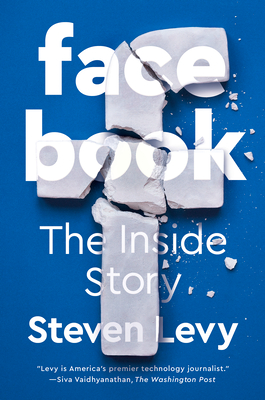Facebook: The Inside Story by Steven Levy

My Rating of “Facebook: The Inside Story” by Steven Levy: 7 / 10

We all know Facebook. Many of us have watched The Social Network movie. Most of us don’t know the entire story. Steven Levy, a serial technology author and Wired columnist, takes a reader on the journey that revolves around Zucherburg and his creation. With over a hundred interviews with people directly and indirectly involved with Facebook (including seven with Zucherburg) Levy paints the picture of Facebook - “the company that has changed the world and reaped the consequences.”
The last book I read from Levy was In The Plex which was the story of Google. He has quite a knack of getting to the right people and extracting the key topics that have shaped the organisations and its impact on society. He writes on Facebook’s incredible responsibility and is in part in particular Zuckerburg’s control of the organisation to do better. Its algorithms and curated content dictate political views, drive polarisation and meld peoples’ minds. It is an extraordinary privilege. Unfortunately the readers learns it has generally been used for the wrong reasons. I thought Levy could have pushed harder and gone deeper on some of these topics.
Think about the vision that originally drove Facebook. It was about bringing the world’s closer together. You may have also heard the other line which was to move fast and break things). Since the user has ultimately become the product, Facebook’s behaviours and ethics are mis-aligned to the above vision. Levy cites a number of examples:
- The lagging changes in privacy
- The complexity for users to apply privacy settings
- Data access back doors left open after those changes are made
Note: This is all without true transparency to the user.
Whether right or wrong, the expansion of Facebook has been focussed on a lens of growth versus operations. It is a shareholder versus stakeholder driven organisation with a CEO / Founder with so much power he can make changes without approval from the board and/or shareholders. For example Facebook’s initial deployments into a many new countries have in the short term negatively impacted cultural norms and ways of communications. Time will tell on the medium to long term impacts. Another example not cited in this book but in a book I’m currently reading about Instagram (No Filter by Sarah Frier). It shows how determined Zuckerberg was to acquire Instagram. He drove a $1b acquisition strategy without any interaction with his board until the last minute.
I stopped using Facebook a number of years ago (my account is dormant) however I have followed its progress closely. Whilst many things have happened since the book was published (2018) it is an accurate overview of Zuckerberg’s background, how the organisation was built and how it has evolved to where it is today. The story of many key players in this saga are told (e.g. Zuckerburg, Sheryl Sandburg, Tim Cook, Chamath Palihapitiya etc.). It is eye opening, somewhat depressing yet interesting book about Facebook which is worth reading.
Three key takeaways from the book:
- Levy best sums up Facebook as the… “twenty-first-century corporate Gatsby, careless in its privileges, self-involved in serving its own needs and pleasures..”
- Going slow means death in the startup world. It has pioneered a new way of measuring success in a digital and social world where people are the product.
- One of Levy’s sobering conclusions is that.. “Facebook may have to change, but Zuckerberg doesn’t believe he has to.”




